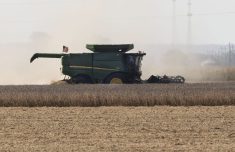Ottawa is showing signs that it may be preparing to take a harder line against the railways to ensure better transportation service for western Canadian farmers and grain companies.
Federal agriculture minister Gerry Ritz said in a March 5 email that all options are on the table as Ottawa looks for ways to ensure better rail service and move more grain off the Prairies.
Ritz said farmers have repeatedly identified the railways as the weak link in the logistics supply chain.
“Our government is looking at all options to deal with the current logistics challenges in the short, medium and long term,” he said.
Read Also

Alberta harvest wrapping up: report
Harvest operations advanced to 96 per cent complete in Alberta as of Oct. 7, with only a few late-seeded cereal and canola fields remaining, according to the latest provincial crop report.
“Farmers and our economy need a reliable, efficient logistics system, and our government will not allow farmers to be held hostage by this poor service.”
Earlier this week, Canada’s largest grain company, Richardson International, took the unusual step of trucking canola to Thunder Bay from its elevators in southern Manitoba.
Richardson spokesperson Tracey Shelton said the company started transferring grain this week and will continue until available capacity at Thunder Bay has been filled.
“We’re moving grain from our facilities out to Thunder Bay so we can … open up space in the country … and fill space that’s available in Thunder Bay,” Shelton said March 5.
“It’s a desperate situation. We’re certainly anxious and really keen on getting grain moving so we’re looking at all the opportunities that we might have to do that … and this is one on those options.”
Shelton said the first shipments were canola, but she did not rule out the possibility that other crops would be moved as well.
“This is just a start so we may look at moving other crops … as the weeks and months go by.”
Richardson’s elevators in southern Manitoba include Starbuck, Letellier, Brunkild and Stonewall. The closest of those locations is 750 kilometres from Thunder Bay.
Last month, under mounting pressure from farmers and grain companies, Ottawa took steps to beef up railway performance data that is collected by the federal Grain Monitoring Program (GMP).
Officials with Quorum Corp., which is contracted by Ottawa to collect data on grain movements and railway performance, said expanding GMP data will provide shippers with a better understanding of how railways and the grain handling and transportation system are working.
The GMP will monitor:
• The number of cars ordered by grain shippers each week
• The number of cars committed by railways each week
• The number of cars actually placed at country locations each week
• The number of hopper cars waiting at terminals to be unloaded
• The number of shifts dedicated to unloading grain cars at export terminals
• The number of shifts where terminal workers have no grain cars to unload
More emphasis will also be placed on measuring grain movement between Canada and the United States.
“When we started the Grain Monitoring Program, the U.S. market wasn’t a big market for Canadian grain…. That’s changed quite a bit,” Hemmes said.
“We’ve probably doubled or maybe even tripled the volume so we need to understand that better and we also need to understand the kind of service that’s going into it.”
Rail companies are increasingly dedicating more of their resources on the eastern Prairies to move commodities other than grain.
Hemmes said that has complicated grain company efforts to match grain shipments with ocean vessels waiting at port.
“The fact that … the railways are choosing where grain is going to get sourced from frustrates the plans that grain companies put together when they make a sale,” Hemmes said.
“The grain companies know it’s happening. They’ve told us. They’ve told the government … but there isn’t anything you can do if that’s the way that the market and the regulatory environment is set up. They (the railways) are going to do what they think is best for their business.”
Hemmes said the number of ships waiting at port in Vancouver had dropped slightly as of March 5.

















